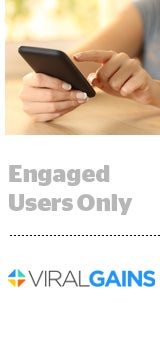ViralGains, a video advertising platform, raised $13.5 million in a Series B funding round, the company said Thursday. The funding includes $10 million in equity investment from First Analysis and Origin Ventures and $3.5 million in debt funding from Square 1 Bank.
ViralGains, which serves sequential video ads to consumers, will invest the funds into extending its machine-learning algorithms and creating templated solutions for buyers to make the platform easier to use. It will also expand into new markets such as Europe.
“Video is a fundamentally new form of advertising,” said Tod Loofbourrow, CEO of ViralGains. “Because you know who’s watching, you can have a two-way conversation with a consumer, understand who is engaged and use that to drive customers from discovery, interest, purchase and, ultimately, loyalty.”
ViralGains’ data comes from surveys delivered at the end of a video ad as well as a partnership with Nielsen Marketing Cloud.
“Let’s say you have an ad for an automobile,” Loofbourrow said. “We ask those consumers questions in [the ad] unit, like ‘Can you see yourself driving this car?’ That helps us understand what’s going on in that particular consumer’s head and deliver a tailored message.”
From 6% to 12% of viewers take the survey, Loofbourrow said, because it’s catching them after they’ve chosen to watch an ad rather than interrupting a browsing experience.
“In that context, they’re happy to answer questions,” he said.
ViralGains charges based on engagement: videos watched for more than 30 seconds of a consumer’s own volition (i.e., no pre-rolls, post-rolls or pop-ups).
“A two-second view of half the ad with the sound off is not an engagement with the message of that ad,” Loofbourrow said. “It’s a scroll-by view in a news feed or a couple seconds that popped on the screen. They’re not getting data about engagement, they’re getting data about how long it took someone to find the ‘X’ or scroll by the ad.”
ViralGains, which launched in 2013, works with 70 Fortune 500 advertisers, including four out of the five top auto companies and banks. It declined to name specific clients.











